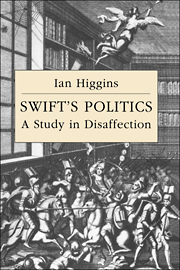Book contents
- Frontmatter
- Contents
- Preface
- List of abbreviations
- 1 Swift's political character
- 2 Revolution, reaction and literary representation: Swift's Jacobite Tory contexts
- 3 The politics of A Tale of a Tub
- 4 The politics of Gulliver's Travels
- Bibliography
- Index
- Cambridge Studies in Eighteenth-Century English Literature and Thought
3 - The politics of A Tale of a Tub
Published online by Cambridge University Press: 25 August 2009
- Frontmatter
- Contents
- Preface
- List of abbreviations
- 1 Swift's political character
- 2 Revolution, reaction and literary representation: Swift's Jacobite Tory contexts
- 3 The politics of A Tale of a Tub
- 4 The politics of Gulliver's Travels
- Bibliography
- Index
- Cambridge Studies in Eighteenth-Century English Literature and Thought
Summary
A Tale of a Tub To which is added The Battle of the Books and the Mechanical Operation of the Spirit is a baroque miscellany book on abuses in religion and learning. Its satiric prosecution of religious enthusiasm draws on Restoration religious polemic and patristic writings against heresy. In particular, the great Restoration satire of the Commonwealth period, Samuel Butler's Hudibras, with which Swift was said to be entirely familiar, has been recognized as a significant antecedent text to the Tale. Butler, like Swift, satirizes hubris, nonconformity, religious fanaticism (analysed as a psychopathology), pedantry, and dullness. Both satirists impute a nexus between popery and Protestant nonconformity, connect occult learning, astrology and religious enthusiasm as fanatical imposture, and pillory sectarian preaching, predestinarian doctrine, Quakerism and sectarian claims of divine revelation and inspiration such as the Quaker doctrine of the ‘Inner Light’.
The religious satire of A Tale of a Tub and A Discourse Concerning the Mechanical Operation of the Spirit, situated principally in a seventeenth-century tradition of Anglican apologetic and invective, has been regarded by some modern scholars as ‘old-fashioned’ in content and polemical vision at the time of its composition (c. 1696–7) and publication (1704). The work is not regarded as having any immediate political purpose, although, especially in its satire on Dissent, it is seen to be informed by Swift's experience as an Anglican priest at Kilroot near Belfast in 1695–6, a parish comprised largely of Presbyterians.
- Type
- Chapter
- Information
- Swift's PoliticsA Study in Disaffection, pp. 96 - 143Publisher: Cambridge University PressPrint publication year: 1994
- 1
- Cited by



